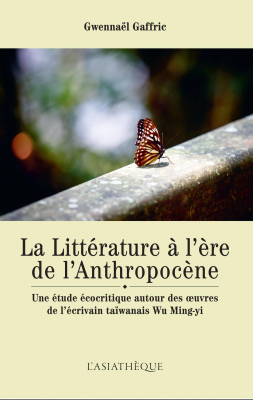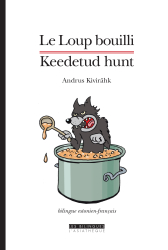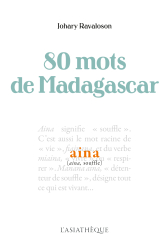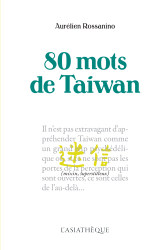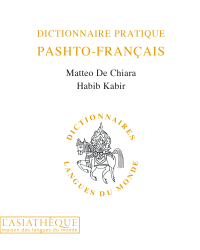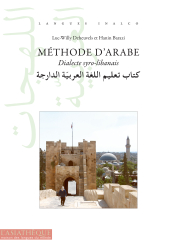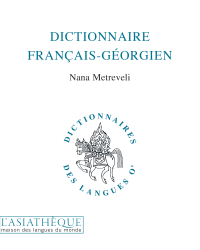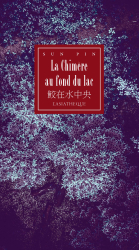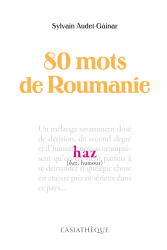Details
Format: Paperback
ISBN: 9782360571901
Collection: Études formosanes
12 x 19 cm
Weight: 415 gr
Pages: 420
First publication: 20/03/2019
Last printing: 03-2019
La Littérature à l'ère de l'Anthropocène
Une étude écocritique autour des œuvres de l'écrivain taïwanais Wu Ming-yi
Preface : Stéphane Corcuff
A study of the interactions between literature and ecology through the unique and universal perspective of a major Taiwanese writer
Taking an eco-critical approach, Gwennaël Gaffric discusses the literary treatment of ecological issues in Taiwan. He focuses his study on the works of Wu Ming-yi, a major figure in Taiwanese literary, artistic and militant scenes, but he seeks to expand his presentation by putting in perspective and dialogue texts from other contemporary Taiwanese authors, as well as that reflections proposed by thinkers from several disciplines and all geographical horizons, Asia, Europe and elsewhere. He achieves an impressive synthesis, where ecology becomes an ontology of the relationship between humans and non-humans and an epistemological path to think the Anthropocene. Preface by Stéphane Corcuff. —- Gwennaël Gaffric (born in 1987) is a lecturer in Chinese language and literature at Jean-Moulin Lyon 3 University. He is the author of several articles in French, English and Chinese on Chinese-language literature (China, Hong Kong and Taiwan). A literary translator, he directs the "Taiwan Fiction" collection at l'Asiathèque. Among his translations published at l'Asiathèque : the City of Pains (Wu Nien-jen and Chu Tien-wen), Membrane (Chi Ta-wei) and the Magician on the bridge (Wu Ming-yi). His recent research focuses on contemporary sinophic science fiction. As such, he is also the translator of the trilogy of Liu Cixin (Actes Sud edition) initiated with the Problem with three bodies, and the War of the bubbles, Kao Yi-feng, Mirobole editions. Wu Ming-yi (born in 1971) is a professor of literature at Dong Hwa National University. Known for his environmental commitment, he is a major author of the contemporary Taiwanese literary scene. Sometimes compared to Haruki Murakami and David Mitchell, he has become a singular voice in world literature. Several of his literary works have been published in French: the Sleeping Navigation Lines (You Feng, 2013), the Man with the Faceted Eyes (Stock, 2014, 2014 Fiction Prize at the Ouessant International Book of Island Books), the Magician on the bridge (L'Asiathèque, 2017) and a short story from the Taipei anthology, Histoires at the corner of the street (L'Asiathèque, 2017).
PRESS REVIEW
Revue de l’Association française d’études chinoises, published with the support of the Centre d'études sur la Chine moderne et contemporaine (UMR 8173) of the École des hautes études en sciences sociales.
"... Gaffric’s reading of Wu Ming-yi extends a compound prism for grasping multiple ways for literature and environmental action to interrogate one another in today’s Anthropocene – insights translatable indeed far beyond Taiwan’s shores. ..."
CONTRIBUTORS' BIOGRAPHIES
Gwennaël Gaffric
Gwennaël Gaffric (born 1987) is a lecturer in Chinese studies at the Université Jean Moulin Lyon 3, where he teaches Chinese language and culture. He is the author of several articles in French, English and Chinese on Chinese-language literature (China, Hong Kong and Taiwan). His recent research focuses on contemporary science fiction in Chinese. He is also one of the leading translators from Chinese of general literature, science fiction, fantasy and the humanities (literary studies, philosophy). His translations include the best-selling volumes of Liu Cixin's Three-Body Problem trilogy. He regularly translates for L'Asiathèque, where he heads the "Taiwan Fiction" collection. He has also published at L'asiathèque: La littérature à l'ère de l'anthropocène (2019).
Stéphane Corcuff
Stéphane Corcuff (born in Brest in 1971) obtained his doctorate in 2000 from the Institute of Political Studies in Paris. A teacher-researcher specializing in the Chinese world, he particularly studies Taiwan - where he lived for long periods - from the perspective of the identity dynamics of its margins, its geopolitical history and its political recomposition. Director of the Taipei Branch of CEFC 2013 to 2017, he is a member of the editorial board of "China Perspectives".
TABLE OF CONTENTS
Remerciements (Acknowledgements)
Prélude à l’Anthropocène, préface de Stéphane Corcuff (Prelude to the Anthropocene, preface by Stéphane Corcuff)
Introduction (Introduction)
La littérature taïwanaise à l’ère de l’Anthropocène (Taiwanese Literature in the Age of the Anthropocene)
1. La littérature au prisme de l’Anthropocène (1. Literature through the lens of the Anthropocene)
2. Pourquoi Taiwan ? (2. Why Taiwan?)
3. Pourquoi Wu Ming-yi ? (3. Why Wu Ming-yi?)
4. L’écosystème textuel de Wu Ming-yi (4. The textual ecosystem of Wu Ming-yi)
5. Philosophie, science et littérature : des perspectives et des limites du transtexte (5. Philosophy, science and literature: perspectives and limits of transtext)
6. Wu Ming-yi et la question de la tradition textuelle chinoise (6. Wu Ming-yi and the question of the Chinese textual tradition)
Chapitre premier (Chapter one)
Natures (Nature)
1. Nature, romantisme et environnementalisme dans la littérature taïwanaise (1. Nature, romanticism and environmentalism in Taiwanese literature)
1.1. Littérature de reportage (1.1. Literature of reportage)
1.2. Littérature de voyage et de la wilderness (1.2. Travel and wilderness literature)
1.3. Littérature pastorale (1.3. Pastoral literature)
2. De la littérature de la nature à l’écopoétique (2. From nature literature to ecopoetics)
2.1. Définition d’un nouveau genre : le nature writing (2.1. Definition of a new genre: nature writing)
2.2. Appropriation du nature writing américain (2.2. Appropriation of American nature writing)
2.3. Le nature writing à Taiwan (2.3. Nature writing in Taiwan)
2.3.1. Liu Ke-hsiang (2.3.1. Liu Ke-hsiang)
2.3.2. Wang Chia-hsiang (2.3.2 Wang Chia-hsiang)
Chapitre II (Chapter Two)
Passerelles (Bridges)
1. Wu Ming-yi et le nature writing : humains et papillons (1. Wu Ming-yi and nature writing: humans and butterflies)
2. Dénaturer la Nature (2. Denaturing Nature)
2.1. Une écologie sans nature ? (2.1. An ecology without nature?)
Chapitre III (Chapter Three)
Eaux (Waters)
1. Poétique de l’eau (1. Poetics of water)
1.1. Eaux mouvantes (1.1 Moving waters)
1.2. Eaux humaines (1.2 Human waters)
1.3. Eaux-mondes (1.3. world-water)
2. Politique de l’eau (2. Politics of water)
2.1. Problèmes écologiques et environnementalisme à Taiwan (2.1. Ecological problems and environmentalism in Taiwan)
2.2. Écriture et écologisme militant : Wu Ming-yi et le projet de « Kuokuang pétrochimies » (2.2. Writing and militant environmentalism: Wu Ming-yi and the "Kuokuang petrochemicals" project)
Chapitre IV (Chapter Four)
Terroirs (Land)
1. Du terroir au post-terroir (1. From terroir to post-terroir)
2. Le paysage dans l’histoire (2. The landscape in history)
3. Histoire onirique et histoires connectées (3. Dreamlike history and connected stories)
Chapitre V (Chapter V)
Espèces (Species)
1. Nommer, classer et administrer les vivants (1. Naming, classifying and administering the living)
1.1. Zoos animaux, zoos humains (1.1 Animal zoos, human zoos)
2. Devenirs-animal (2. Becoming-animal)
3. Voir le monde avec des yeux à facettes (3. Seeing the world with faceted eyes)
3.1. Le regard de l’homme aux yeux à facettes (3.1. The look of the man with faceted eyes)
3.2. Mémoires plurielles (3.2 Plural memories)
3.3. La bodhisattva et les bambous (3.3. The Bodhisattva and the Bamboo)
Chapitre VI (Chapter VI)
Catastrophes (Disasters)
1. L’effet papillon, la Lune et la science-fiction (1. The Butterfly Effect, the Moon and Science Fiction)
2. Le vortex et le monde (2. The wormhole and the world)
3. L’ère des hyperobjets (3. The era of hyperobjects)
Chapitre VII (Chapter VII)
Écotopies (Ecotopias)
1. Réinventer le temps et l’espace (1. Reinventing time and space)
2. De l’utopie wayonésienne à l’hétérotopie de l’église de la forêt (2. From the Wayonesian utopia to the heterotopia of the forest church Conclusion)
Conclusion (Conclusion)
1. De la « poétique de la Relation » à la politique du cosmos (1. From the "poetics of Relation" to the politics of the cosmos)
Bibliographie (Bibliography)
1. De Wu Ming-yi (1. About Wu Ming-yi)
1.1. OEuvres littéraires (romans, recueils de nouvelles et de sanwen) (1.1 Literary works (novels, collections of short stories and sanwen))
1.2. Autres écrits de Wu utilisés dans ce travail (1.2. Other writings of Wu used in this work)
2. Sur Wu Ming-yi (2. On Wu Ming-yi)
2.1. Monographies (2.1. Monographs)
2.2. Articles scientifiques et chapitres d’ouvrages collectifs (2.2. Scientific articles and chapters of collective works)
2.3. Comptes rendus de lecture (2.3 Reading reviews)
2.4. Préfaces (2.4. Forewords)
3. Ouvrages littéraires (3. Literary works)
4. Études, ouvrages scientifiques et théoriques (4. Studies, scientific and theoretical works)
4.1. Monographies (4.1. Monographs)
4.2. Articles et chapitres d’ouvrages collectifs (4.2. Articles and chapters in collective works)
4.3. Sites et pages Internet (4.3. Internet sites and pages)
Index des auteurs et des personnes (Index of authors and persons)
Index des œuvres de Wu Ming-yi (Index of the works of Wu Ming-yi)
Index des notions (Index of notions)
